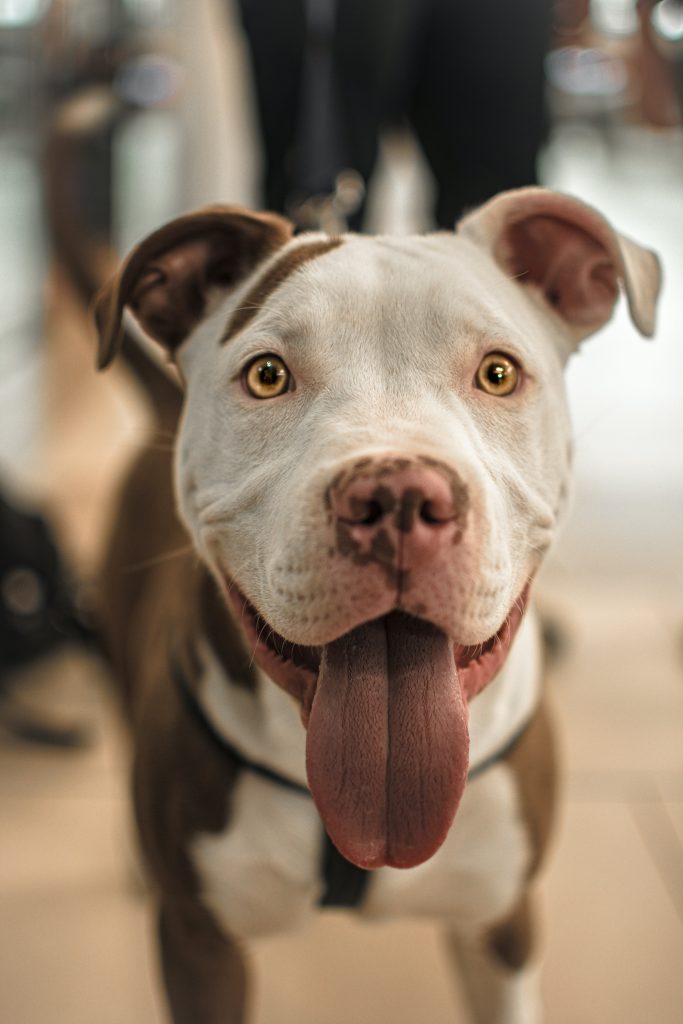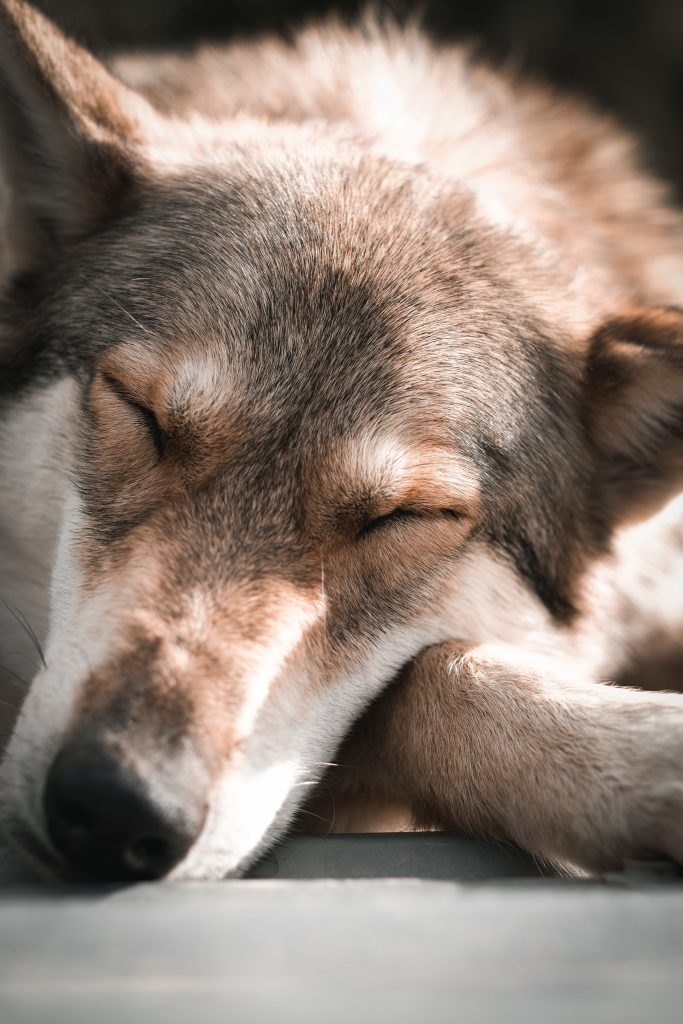Are you struggling why does my dog whine at night? It’s not uncommon for dogs to vocalize their discomfort or distress during the dark hours. This blog post aims to provide insights into why dogs might be whining at night, covering possible causes such as health issues, anxiety, and lack of proper training.
Don’t worry! We’re here to help you understand your furry friend better and guide them towards quiet nights ahead.

Key Takeaways
- Dogs may whine at night due to various reasons, including medical issues, boredom or excess energy, anxiety and separation anxiety, pain or discomfort, and lack of proper training.
- Providing regular exercise and mental stimulation during the day can help reduce your dog’s nighttime whining caused by boredom or excess energy.
- Creating a comfortable sleeping environment with a cozy bed and calming scents can help alleviate anxiety-related whining in dogs.
- It’s important to address any underlying medical issues and seek proper training to teach your dog appropriate behavior at night.
Possible Reasons for Dog Whining at Night
There are several potential reasons why dogs may whine at night, including medical issues, boredom or excess energy, anxiety and separation anxiety, pain or discomfort, and lack of proper training.
Medical issues
Sick dogs may whine at night. They can’t tell you what’s wrong. Whining is their way of saying “I feel bad.” A sick dog might have a sore tummy. This happens with bloating or other gut problems.
Old dogs could start to whine if they don’t feel well. A vet check-up can point out these health problems early on. It’s best to see the doctor right away if your dog starts to act different at night.
Boredom or excess energy
Dogs are energetic creatures, and when they don’t get enough physical or mental stimulation during the day, it can lead to boredom or excess energy at night. This can result in whining behaviors as they try to release that pent-up energy.
Dogs need regular exercise and playtime to keep them happy and tired by the time bedtime comes around.
One way to address this is by making sure your dog gets plenty of exercise during the day. Take them for walks, play fetch, or engage in interactive games that challenge their mind.
Puzzle toys and treat-dispensing toys can also help stimulate their brain and provide entertainment throughout the day. By keeping your dog active and mentally engaged, you can help reduce their whining at night due to boredom or excess energy.
Anxiety and separation anxiety
Dogs can experience anxiety and separation anxiety, which may cause them to whine at night. Anxiety in dogs can be triggered by various factors, such as changes in their routine or environment.
Separation anxiety occurs when a dog becomes distressed when left alone. This can lead to excessive vocalization, including whining. It’s important to understand that dogs with anxiety or separation anxiety are not trying to misbehave but are expressing their distress through whining.
Providing comfort, creating a safe and secure sleeping area, and seeking professional help if needed can alleviate the symptoms of anxiety and reduce nighttime whining in dogs.
Pain or discomfort
If your dog is whining at night, it could be because they are in pain or discomfort. Dogs may experience physical discomfort due to health issues like an upset stomach or bloating.
Sometimes, older dogs may develop sudden pain that causes them to whine at night. It’s important to pay attention to any changes in their behavior and consult with a veterinarian if you suspect pain or discomfort as the cause of their whining.
Taking care of your dog’s physical well-being can help alleviate their nighttime distress and promote better sleep for both of you.
Lack of proper training
Without proper training, dogs may not understand how to behave at night, leading to whining. Training is essential for teaching dogs what is expected of them and how to calm down when they’re feeling restless or anxious.
If a dog hasn’t been trained to sleep through the night or has never learned appropriate behaviors for nighttime, they may resort to whining as their way of communicating their discomfort or seeking attention.
Lack of proper training can make it challenging for both the dog and the owner to have a peaceful night’s sleep.

Tips to Stop Dog Whining at Night
Exercise your dog regularly and provide mental stimulation to tire them out before bedtime. Create a comfortable sleeping environment with a cozy bed and calming scents. Address any underlying medical issues and seek proper training to teach your dog appropriate behavior at night.
Seek professional help if needed to ensure your dog’s nighttime whining is resolved effectively.
Proper exercise and mental stimulation
To help reduce your dog’s whining at night, it’s important to provide them with proper exercise and mental stimulation during the day. Dogs need physical activity to burn off excess energy and tire them out before bedtime.
Taking your dog for daily walks or engaging in active playtime can help wear them out and make them more likely to sleep through the night. Mental stimulation is also important for keeping your dog’s mind occupied and preventing boredom, which can contribute to nighttime restlessness.
You can try puzzle toys, interactive games, or obedience training exercises to keep their brains engaged. By ensuring that your dog gets enough exercise and mental stimulation during the day, you may see a decrease in their nighttime whining behavior.
Creating a comfortable sleeping environment
To help stop your dog from whining at night, it’s important to create a comfortable sleeping environment for them. Make sure they have a cozy and quiet place to sleep, like a crate or a bed in a quiet corner of your home.
Use soft bedding that is clean and comfortable. Keep the temperature in the room moderate – not too hot or too cold. Provide them with their favorite toys or blankets so they feel safe and secure.
This will help them relax and reduce any anxiety that may be causing the whining.
Addressing any medical issues
If your dog is whining at night, it’s important to consider if there are any medical issues that could be causing this behavior. Sometimes, dogs whine because they’re experiencing pain or discomfort.
They might have an upset stomach or bloating, which can make it hard for them to sleep peacefully. If you notice any changes in your dog’s eating habits or bathroom routines, it could be a sign that something is wrong.
It’s a good idea to consult with a veterinarian who can properly diagnose and treat any medical conditions your dog may have. Remember, addressing these medical issues can help alleviate your dog’s nighttime whining and ensure their overall well-being.
Providing proper training and discipline
To stop your dog from whining at night, it’s important to provide them with proper training and discipline. Dogs thrive on structure and rules, so establishing clear boundaries is crucial.
Use positive reinforcement techniques to reward good behavior and discourage unwanted ones. Consistency is key – stick to a regular routine for feeding, exercise, and bedtime. Set aside time each day for training sessions to teach your dog basic commands such as sit, stay, and quiet.
Remember to be patient and understanding during the process.
It’s also important to address any behavioral issues that may be causing your dog’s nighttime whining. For example, if separation anxiety is the root cause of their distress, gradually increase the amount of time you leave them alone until they become more comfortable being by themselves.
If needed, seek guidance from a professional dog trainer or behaviorist who can provide tailored advice based on your specific situation.
Seeking professional help if needed
If you have tried all the tips and strategies for stopping your dog from whining at night but nothing seems to work, it may be time to seek professional help. A veterinarian or a professional dog trainer can provide valuable guidance and support in understanding and addressing your dog’s nighttime whining.
They can help identify any underlying medical issues that may be causing the behavior. Additionally, they can offer personalized training techniques tailored to your dog’s specific needs.
Remember, seeking professional help is not a sign of failure but rather a proactive step towards resolving the issue and ensuring your furry friend gets the care they need.

How to Identify the Cause of Dog Whining at Night
Observe your dog’s body language and behavior, keep a journal of when the whining occurs, and consult with a veterinarian for professional guidance.
Pay attention to body language and behavior
To understand why your dog is whining at night, it’s important to pay attention to their body language and behavior. Dogs communicate through more than just vocalizations, so observing how they act can give you clues about what might be causing the whining.
Look for signs of discomfort or restlessness, such as pacing, panting excessively, or repeatedly changing positions. Notice if they seem agitated or anxious in any way. By closely watching your dog’s body language and behavior during their nighttime whining episodes, you can gather valuable information that will help you determine the underlying cause and find the best solution.
Keep a journal of whining occurrences
To better understand why your dog is whining at night, it can be helpful to keep a journal of when and how often the whining happens. Write down the date, time, and any relevant details about the circumstances surrounding the whining.
For example, note if your dog was recently alone or if there were any loud noises that could have caused anxiety. By keeping track of these occurrences, you may start to notice patterns or triggers that can help identify the cause behind your dog’s nighttime whining.
This information can also be useful when discussing the issue with a veterinarian or professional trainer who can provide further guidance on how to address this behavior.
Consult with a veterinarian
If your dog is whining at night and you’ve tried everything to address the problem with no success, it may be time to consult with a veterinarian. A vet can help identify any underlying medical issues that could be causing the whining, such as digestive problems or pain and discomfort.
They can also provide guidance on behavior and training techniques tailored specifically to your dog’s needs. Remember, a veterinarian is a valuable resource when it comes to understanding and resolving your dog’s nighttime whining.

Conclusion
In conclusion, understanding why your dog is whining at night is key to finding a solution. It could be due to medical issues, boredom, anxiety, pain or discomfort, or lack of training.
By providing exercise, creating a comfortable sleeping environment, addressing any health concerns and giving proper training, you can help reduce nighttime whining. Remember to consult with a veterinarian if needed and seek professional help for persistent issues.
Restful nights are possible with patience and understanding of your furry friend’s needs.
FAQs
1. What are the common causes of a dog whining at night?
Common causes of nighttime dog whining include pet distress, sleep disturbances, and canine discomfort such as bloating in dogs.
2. Why does my dog show anxiety at night?
Your dog may have anxiety at night due to restlessness or some veterinary issues that cause discomfort or pain.
3. Is excessive vocalization normal in dogs during the nights?
Excessive nighttime dog vocalization could be due to several reasons including boredom, medical issues, or lack of sleep training.
4. How can I understand my dog’s communication at night?
Decoding the mysteries of nighttime whining in dogs involves understanding their behavior patterns and possibly getting insights from your vet if it persists.
5. What should I do if my dog is restless and keeps on whining?
If your pet shows signs like continuous nighttime whining, it’s essential to address it by exploring reasons behind this behavior like health problems or emotional distress.


